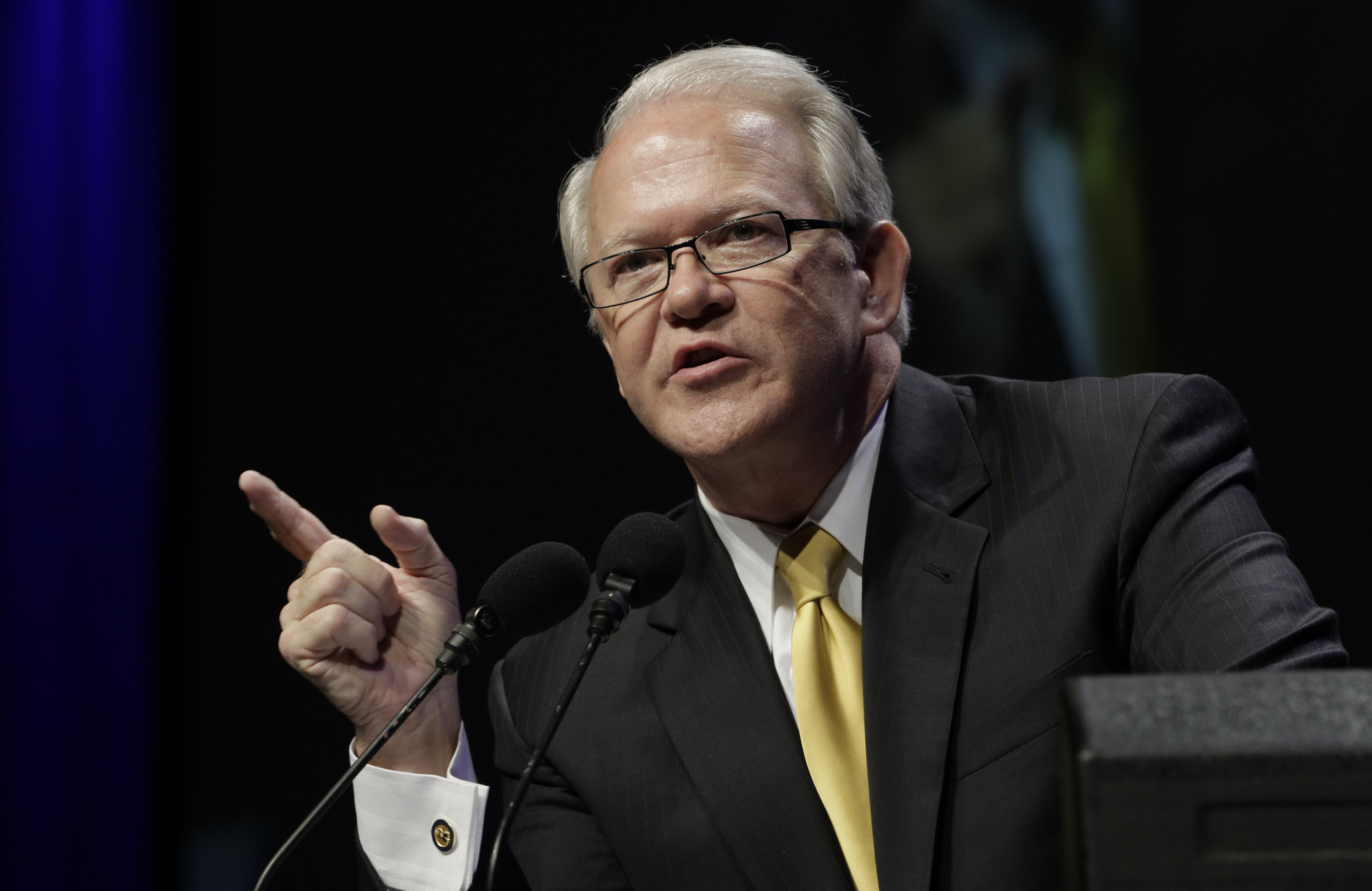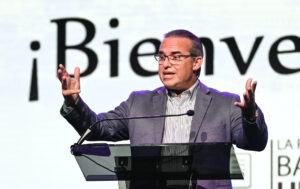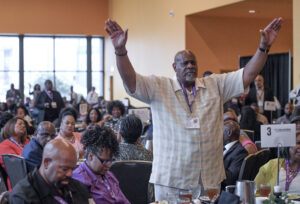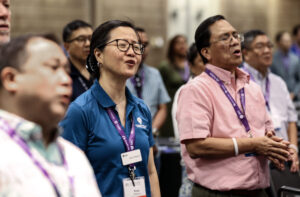
Originally posted June 12, 2013
HOUSTON (BP) — Challenging days, both in the culture and in the church, call for an unprecedented faithfulness in prayer, Executive Committee President Frank Page told messengers to the Southern Baptist Convention’s annual meeting in Houston June 11.
“Most everyone knows of my most recent efforts in these past months to persuade Scouting leaders to maintain a policy which I believe upholds a commitment to morality. That battle was lost. It broke my heart,” Page said.
“Most of us know that in a few days we can expect the Supreme Court to issue a ruling about the constitutionality of DOMA, the Defense of Marriage Act,” he said. “We need to pray like never before. We are under attack. The worldview of God and our Lord Jesus and the Holy Spirit is under attack.”
Instead of advancing as it ought, the Southern Baptist Convention in some ways is guilty of sliding backwards, Page said, adding that the world is winning too many battles and “the evil one has splintered God’s people into so many directions that unity is at best an elusive goal.”
Page mentioned an initiative — Great Commission Advance — which he said will have “an extremely impressive and hard launch” at next year’s annual meeting in Baltimore.
“Great Commission Advance is an effort in partnership with our entities, with our seminaries, our mission boards, our state convention partners, our pastors and churches to present to this convention that which is called Great Commission Advance,” Page said. “Part of it is the 1% Challenge we’ve already started.”
Earlier in the day, Page had said that if Southern Baptists would just give 1 percent of budget more through the Cooperative Program, “next year we’d see $100 million go to support our seminaries, our mission work and all the ministries of the Southern Baptist Convention.”
Page thanked SBC President Fred Luter for leading Franklin Avenue Baptist Church in New Orleans to take the 1% Challenge.
“We will be talking more about Great Commission Advance, but I want you to know as your Chief Encouraging Officer, I am not ready to back down, back off or back up from God’s call for us to be a Great Commission people,” Page said. “I want you to be a part of moving forward, not moving backward, but moving forward for the glory of God and for the cause of Christ.”
Page recapped some of the ways he has worked during the past year to help turn the convention to a more God-honoring direction in key areas: prayer, ethnic participation and Calvinism.
Gary Frost, vice president for the North American Mission Board’s Midwest Region, and Gordon Fort, senior vice president for prayer mobilization and training at the International Mission Board, joined Page on the platform to pray for revival and unity within the convention.
During the past year, Page has been calling for increased involvement from ethnic groups in the leadership of the convention, and he reported that he has seen some encouraging signs.
Of the Hispanic Advisory Council in particular, Page said, “Information has been received, encouragement is deepening and this fastest-growing ethnic group is stepping up to the plate in involvement in Southern Baptist missions and ministries.”
By the year 2050, Page said, there will be no majority population in the United States. Instead, everyone, including Anglos, will be part of a minority people group. “And to reach this world for Christ we need to do it together,” Page said.
Page was joined onstage by pastors A.B. Vines and K. Marshall Williams of the African American Advisory Council and professor Daniel Sanchez of the Hispanic Advisory Council to pray for unity among ethnic groups in the task of accomplishing the Great Commission.
Another topic of concern to the convention, Page said, has been disagreements over Calvinism that have led to serious divisions. Page assembled an advisory committee on Calvinism last year, not knowing whether any progress could be made.
The committee, Page said, endeavored to “start talking to each other and not about each other and at each other.”
What they found, he said, is that there are “massive areas, shocking to see, upon which we do agree. In fact, in talking with one another we began to develop friendships and we began realizing that we agree far more than we thought we did.”
The Calvinism committee released a report in late May calling on Southern Baptists to stand together for the Great Commission despite theological differences, and Page exhorted messengers to “live by the Christ-like principles” found in the report.
“I am not naïve. I know there will continue to be problems and difficulties but I am convinced that if we will talk to each other together we will see a unity that will allow us to win more men, women, boys and girls to Christ than ever before,” Page said.
Members of the Calvinism advisory group stood with Page on the platform, and he led in prayer toward living out the principles prescribed in the report.
Also in his address to messengers, Page noted that recent data from the convention’s Annual Church Profile survey showed continued declines in nearly every category, including baptisms, average attendance and total giving.
“We desperately need the hand of God,” Page said. “One of our big challenges in these days is that one out of every five Southern Baptist churches will not send in an ACP. We can only tell what we know. Our baptism numbers are down. Or are they? We don’t know because you won’t tell us. Please participate.”
Page closed with the story of a family who sold their business and tithed on the profits to their local church. That church, Page said, forwarded a portion of those receipts through the Cooperative Program for state, national and international missions and ministries.
As a result of that family’s selflessness, Page said, more than $750,000 of their gift went to the International Mission Board; more than $330,000 went to the North American Mission Board and $320,000 went to the convention’s six seminaries.
“Do you see how Christ-like selflessness ministers to all?” Page said.
The issues facing the Southern Baptist Convention, Page said, “are facing us in the local church,” where the average Southern Baptist gives only 2.3 percent of his income to the church.
“If the issue of biblical tithing were settled in the local church, we would not be having the issues we’re having now,” Page said. “… The issue is really not in percentages of Cooperative Program allocation, though that may need to be revisited. I’m not opposed to that. It’s not in the arguing of percentages here and there. The issue is happening in the pew.”
Earlier in the day, during the first part of the Executive Committee report, Page lamented that churches are giving just over 5 percent of their receipts through the Cooperative Program and total missions giving also has declined.
“I know I live in a dream world, but if Southern Baptists were actually to obey God’s call to tithe, which Jesus affirmed, and were to give 10 percent at least, and if churches were to go back to the historical patterns of giving at least 10 percent to missions through the Cooperative Program, friends we would see a dramatic increase so that we could send double, triple the number of missionaries we now do,” Page said.
–30–
Erin Roach is assistant editor of Baptist Press. Get Baptist Press headlines and breaking news on Twitter (@BaptistPress), Facebook (Facebook.com/BaptistPress) and in your email (baptistpress.com/SubscribeBP.asp).
















